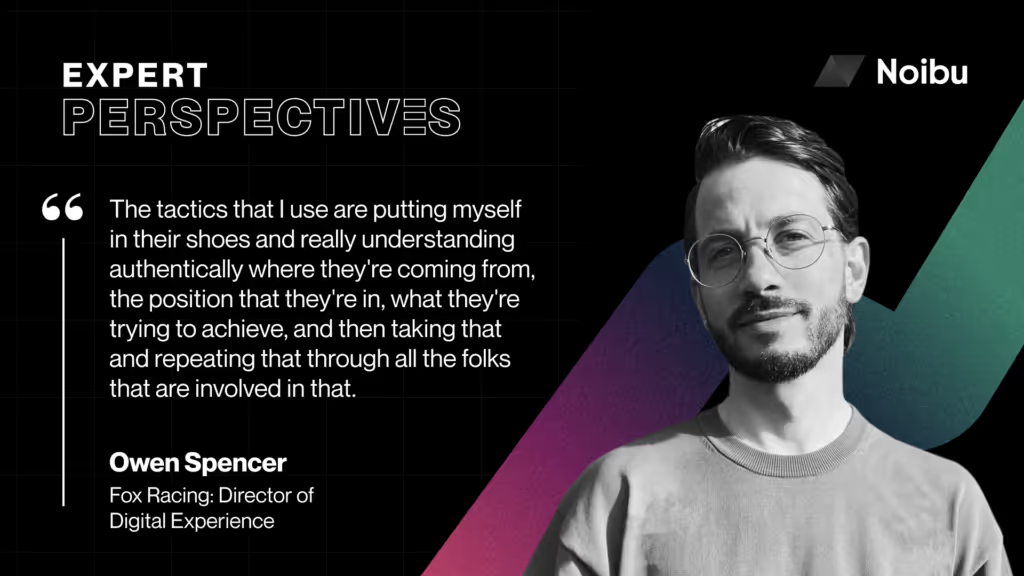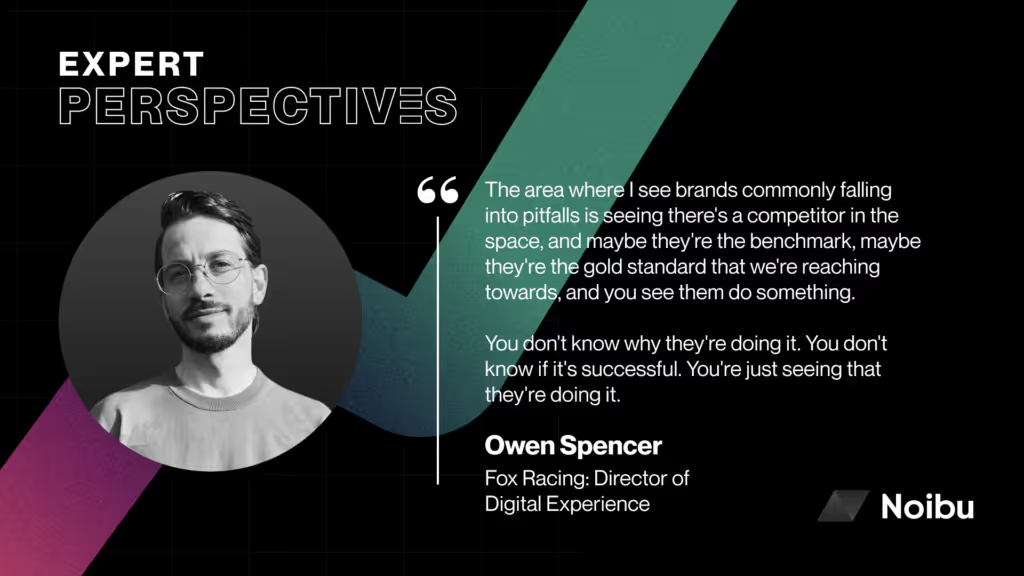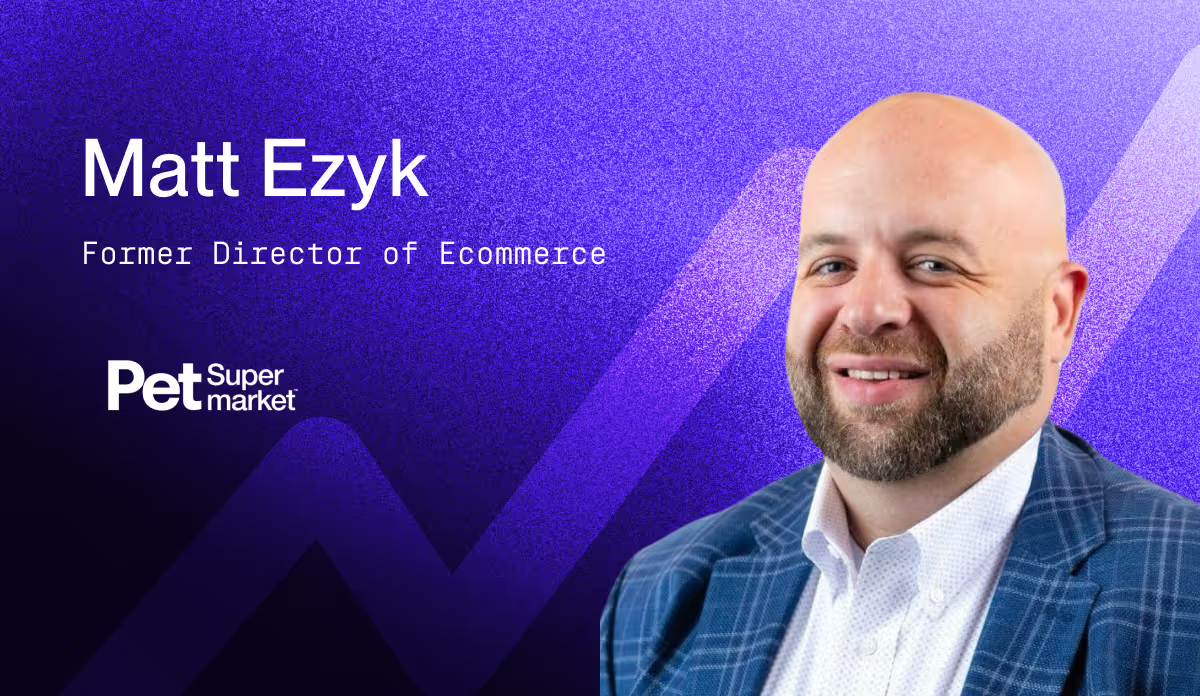The difference between a data-driven & a data-informed approach, with Owen Spencer of Fox Racing
.avif)
Data should inform decisions, not drive them. Having a firm grasp of data science is clearly a huge plus when you’re working out how to grow an ecommerce operation, but it shouldn’t be the be-all and end-all. Can you put yourselves in the shoes of each different stakeholder, can you keep the aims, objectives, and needs of the business and customer in mind when making big decisions?
In this episode of The Ecommerce Toolbox, Kailin Noivo welcomes the Director of Digital Experience at Fox Racing, Owen Spencer for a conversation that spans his career from retail to web development, to his current position. They cover his views on leadership and data, as well as his perspective on the future of the industry.

A data-driven or a data-informed approach?
Owen has many of experience managing teams across different departments, leading them through the challenges of the ever-changing digital environment that ecommerce operates on. As a leader and someone who’s worked with a lot of different leaders, he has built up a strong idea of the strengths and weaknesses of different approaches.
Over his time in the industry – just as in most other industries – the role of data has been growing in importance. These days, companies have access to more of it than ever, and with the help of AI, are able to gather incredible amounts of information relevant to marketing campaigns, sales and ecommerce.
What you choose to do with the data you gather, and how much you let it dictate your decision-making is still down to you, however. On the show, Owen discusses having seen companies veer towards a data-driven approach that essentially eliminates the human aspect, where decisions are made strictly based on data insights.
For Owen, this overlooks the fact that the end-user is a real person themselves, and it takes some human experience, intuition, and knowledge to be able to keep that end-user in mind and make decisions that benefit them.
Comparison with competitors: Why it might not always be a good idea
Owen takes a balanced view on making comparisons between your own company and rival ecommerce stores. He makes the point that it would be almost negligent not to take note of what your competitors are doing and industry trends. But beyond that, comparing yourselves to other companies can have a damaging effect on your decision-making.
Naturally, if you’re looking at what you consider to be the gold standard ecommerce store, and you see them implement some new feature, you may be tempted to have your developers start coming up with the same thing. But if you’re doing this, it means you’ve started making assumptions, which is never a good starting point to be making potentially costly decisions.
Besides the fact that the context of your company and brand is a different beast from your rivals, you don’t know anything about why they brought in that new feature. It could be based on information they have that is completely irrelevant to your business.
But even if your ecommerce company and brand are completely analogous to theirs, you’ve got no way of knowing if they even benefitted from that change. You might spend time and money bringing that onto your platform only to find out that they dumped the idea after a couple of weeks when it turned out to be a dud.
Owen’s overall angle is that, if you focus too much of your attention on comparisons and keeping up with the opposition, then you’re dooming yourself to never be a leader in the space.

The personalized future of ecommerce
The long-term future of ecommerce is unpredictable just as the short-term is – this is the nature of an ever-changing industry that is constantly being shaped by new technological breakthroughs. This doesn’t mean that experts can’t make their own assessments of what the general direction of travel will look like – after all, if you do you have an internal sense of where your industry is going, and you can be well prepared to cope with the fluctuations within that.
For Owen, it’s a case of the ecommerce space moving towards a more personalized user experience, much in the same way that email marketing has shifted the same way. AI and various chatbots have made the prospect of totally personalizing the digital shopping experience more possible than ever, and Owen believes it won’t be long until an almost concierge-like experience will be the norm.
He makes the point that until now, ecommerce stores have attempted to replicate the in-store shopping experience digitally, with all the hundreds of product categories there in front of them. You arrive on the site and it’s your role to navigate through the filters before eventually arriving at the product type you want, where you can browse and make your selection. Owen’s boldest take is that in the future, there will be no navigation, but instead, you will interact with this ‘concierge’ who will discover what it is you're looking for and bring the options to you. Instead of a medium-sized shirt, you could order the shirt that’s made precisely for you.
Listen to the full episode below!
Dive into this latest fascinating episode of The Ecommerce Toolbox: Expert Perspectives with Kailin Noivo and his guest, Owen Spencer, to discover more of Owen’s thoughts on the future of ecommerce, and explore his views on how best to lead your ecommerce platform to success.
👉 Apple: https://apple.co/4bIgdCA
👉 Spotify: https://spoti.fi/4c1y8nq



.avif)
.avif)